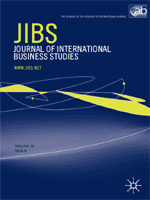How do legacy, emotion, and strategy collide when family businesses go global?
Jean-Luc Arregle, Francesco Chirico, Liena Kano, Sumit K. Kundu, Antonio Majocchi, William S. Schulze
Audio > Play / Stop
CeFEO's Authors
CeFEO counts more than 50 scholars and 30 affiliated researchers. Several studies and reports have consistently identified CeFEO as a leading research environment worldwide in the area of ownership and family business studies.
This research project, has been co-authored by the following CeFEO Members.
Reference
Spotlight highlights research-based findings only. If you’re interested in exploring this project further or delving into the theoretical and methodological details, we encourage you to contact the authors or read the full article for a comprehensive understanding.

Arregle, J.-L., Chirico, F., Kano, L., Kundu, S. K., Majocchi, A., & Schulze, W. S. (2021). Family firm internationalization: Past research and an agenda for the future. Journal of International Business Studies, 52, 1159–1198
https://doi.org/10.1057/s41267-021-00425-2

What is Spotlight?
Spotlight is an innovative online family business magazine designed to bridge the gap between cutting-edge research and the real-world needs of practitioners, owners, and policymakers. Drawing on the latest findings from the Centre for Family Entrepreneurship and Ownership (CeFEO) at Jönköping International Business School, Spotlight delivers insightful, accessible summaries of key research topics. Our mission is to keep the family business community informed and empowered by offering actionable insights, expert analyses, and forward-thinking strategies that enhance business leadership and ownership practices for long-term success.

This article is brought to you by the WIFU Foundation
Spotlight is generously supported by the WIFU Foundation, which promotes research, education, and dialogue in the field of family business. This partnership enables us to continue bridging academic insights and real-world practice for the advancement of responsible family entrepreneurship and ownership.
What makes some family firms flourish abroad while others hold back?
Family businesses are no longer just corner shop legends or local champions—they are increasingly global players. But unlike other companies, family firms bring unique dynamics to the global stage: emotions, legacies, and generations all play a part. This article unpacks the largest review to date of family firm internationalization—220 studies over 30 years—and asks: why do some family firms go global boldly, while others remain cautious? We highlight the key findings, contradictions, and practical lessons for family business leaders ready to navigate the international arena.
Family businesses are no longer just corner shop legends or local champions—they are increasingly global players. But unlike other companies, family firms bring unique dynamics to the global stage: emotions, legacies, and generations all play a part. This article unpacks the largest review to date of family firm internationalization—220 studies over 30 years—and asks: why do some family firms go global boldly, while others remain cautious? We highlight the key findings, contradictions, and practical lessons for family business leaders ready to navigate the international arena.
Family businesses generate over half of the world's GDP and employ a significant portion of the global workforce. They are integral not just to local economies, but increasingly to the global marketplace. In fact, the share of large multinational companies owned or controlled by families is expected to nearly triple between 2015 and 2025.
Yet, international expansion is no easy task for family businesses. Emotional attachments, long-term legacies, and desire for control often clash with the unpredictable, high-risk nature of global markets. While some family firms scale international heights, others are hesitant or selective. Why? What drives these different trajectories?
To provide clarity, this article summarizes a landmark study that systematically reviewed 220 academic articles spanning three decades, identifying patterns, tensions, and key lessons in how family firms internationalize.
What We Studied
The study—published in the Journal of International Business Studies—conducted a systematic review of 220 conceptual and empirical articles published between 1991 and 2020. Using PRISMA-P methodology, the authors categorized findings using seven core international business (IB) themes:
- Scale of internationalization
- Scope of international reach
- Entry mode (e.g., exporting, joint ventures, acquisitions)
- Location choices
- Process and timing of international expansion
- Pace and rhythm of expansion
- Performance outcomes
They also applied an integrative framework that bridges traditional IB theories (e.g., Uppsala model, OLI paradigm) with family business concepts like socio-emotional wealth (SEW) and bifurcation bias. This cross-disciplinary approach provides a comprehensive lens through which to assess how family firms behave when they go global.
Key Insights
1. Family Firms Are Not Uniform Players in Globalization
Family businesses show tremendous variation in their international strategies. This diversity stems from:
- Emotional ties to the business (e.g., desire to preserve family legacy)
- Levels of family control and involvement
- Intergenerational differences in values and risk appetite
- Contextual factors, such as home country institutions and industry type
This makes sweeping generalizations about family firm internationalization both difficult and misleading.
2. Scale vs. Scope: Going Big vs. Going Broad
- Scale refers to how much of a firm’s business is international. Some family firms go deep into one or two markets, especially where trust-based networks are strong.
- Scope concerns how many countries or regions the firm operates in. Here, family firms often show narrower reach than non-family firms due to risk aversion and limited social capital abroad.
Interestingly, family firms with non-family managers or outside board members tend to expand more broadly.
3. Entry Modes: From Joint Ventures to Wholly Owned Subsidiaries
Entry mode decisions are among the most contested areas:
- SEW preservation often leads family firms to prefer control (e.g., wholly owned subsidiaries).
- At the same time, concerns about financial risk push many toward low-commitment modes like exporting or joint ventures.
- Entry mode preferences shift over time as firms gain experience and resources, highlighting the dynamic nature of internationalization.
4. Location Choices: Proximity Isn’t Everything
Contrary to assumptions, family firms don’t always prefer culturally similar or nearby markets. Instead:
- Strategic objectives, not distance alone, shape location decisions.
- The personal preferences of family leaders and existing family or ethnic networks abroad often determine where and when to expand.
5. The Internationalization Process: A Journey, Not a Formula
While some family firms follow the Uppsala model (gradual internationalization), others show "born global" behavior, especially:
- Under second-generation leadership with global education or experience
- When pursuing high-quality niche markets
- In sectors where speed is critical
The process is influenced by internal governance, stewardship orientation, and succession dynamics.
6. Pace and Rhythm: Slow and Steady, or Bold and Fast?
- Family firms typically start slower than their non-family counterparts but can accelerate once trust and experience are built.
- Succession events often act as turning points, affecting the speed and rhythm of expansion.
- Firms with greater ownership concentration may move faster—but not always in a straight line.
7. Performance: Profits, Legacy, or Something Else?
The impact of internationalization on performance is inconclusive:
- Some studies report lower financial returns due to cautious strategies or limited scalability.
- Others find enhanced resilience, innovation, and CSR activity, especially when firms stay regionally focused.
- Non-financial goals like legacy building, philanthropy, and succession are often overlooked but vital for family firms.
Takeaways for Family Business Leaders
Recognize Your Firm’s Unique Profile
Before expanding internationally, assess:
- Generational involvement
- Family goals and values
- Governance structure
- Available resources (financial, managerial, relational)
Balance Control with Collaboration
Control is important—but don’t let it limit growth. Consider:
- Partnerships that build local knowledge
- Phased approaches (e.g., exporting → JV → WOS)
Invest in International Experience
Hiring or developing talent with global exposure can bridge knowledge gaps and boost confidence in foreign ventures.
Use Social Capital Wisely
Leverage family networks but avoid insularity. Seek diversity in decision-making and governance.
Define What "Success" Really Means
Is it profit, legacy, succession, or social impact? Clarify your objectives before choosing your strategy.
Impact
This landmark review makes a strong case for moving beyond one-size-fits-all models. It also demonstrates the value of interdisciplinary research in capturing the complex interplay of family, business, and global strategy.
Family firm internationalization:
- Needs tailored strategies rooted in context
- Is shaped by both rational economics and family emotion
- Offers fertile ground for theoretical innovation in international business
It also offers social insights: when family firms internationalize well, they often reinvest in communities, promote values-led leadership, and model sustainable growth.
Recommendations
- Use a family-aware international strategy framework (e.g., OLI + SEW).
- Build capabilities through education, external hiring, and board diversification.
- Engage advisors who understand both IB strategy and family dynamics.
- Measure international success using both financial and non-financial KPIs.
- Champion research that explores legacy, social impact, and innovation—not just exports and profit.

CeFEO's Authors
CeFEO counts more than 50 scholars and 30 affiliated researchers. Several studies and reports have consistently identified CeFEO as a leading research environment worldwide in the area of ownership and family business studies. This research project, has been co-authored by the following CeFEO Members.
Reference
Spotlight highlights research-based findings only. If you’re interested in exploring this project further or delving into the theoretical and methodological details, we encourage you to contact the authors or read the full article for a comprehensive understanding.

Arregle, J.-L., Chirico, F., Kano, L., Kundu, S. K., Majocchi, A., & Schulze, W. S. (2021). Family firm internationalization: Past research and an agenda for the future. Journal of International Business Studies, 52, 1159–1198
https://doi.org/10.1057/s41267-021-00425-2

What is Spotlight?
Spotlight is an innovative, AI-powered, online family business magazine designed to bridge the gap between cutting-edge research and the real-world needs of practitioners, owners, and policymakers. Drawing on the latest findings from the Centre for Family Entrepreneurship and Ownership (CeFEO) at Jönköping International Business School, Spotlight delivers insightful, accessible summaries of key research topics. Our mission is to keep the family business community informed and empowered by offering actionable insights, expert analyses, and forward-thinking strategies that enhance business leadership and ownership practices for long-term success.

This article is brought to you by the WIFU Foundation
Spotlight is generously supported by the WIFU Foundation, which promotes research, education, and dialogue in the field of family business. This partnership enables us to continue bridging academic insights and real-world practice for the advancement of responsible family entrepreneurship and ownership.










